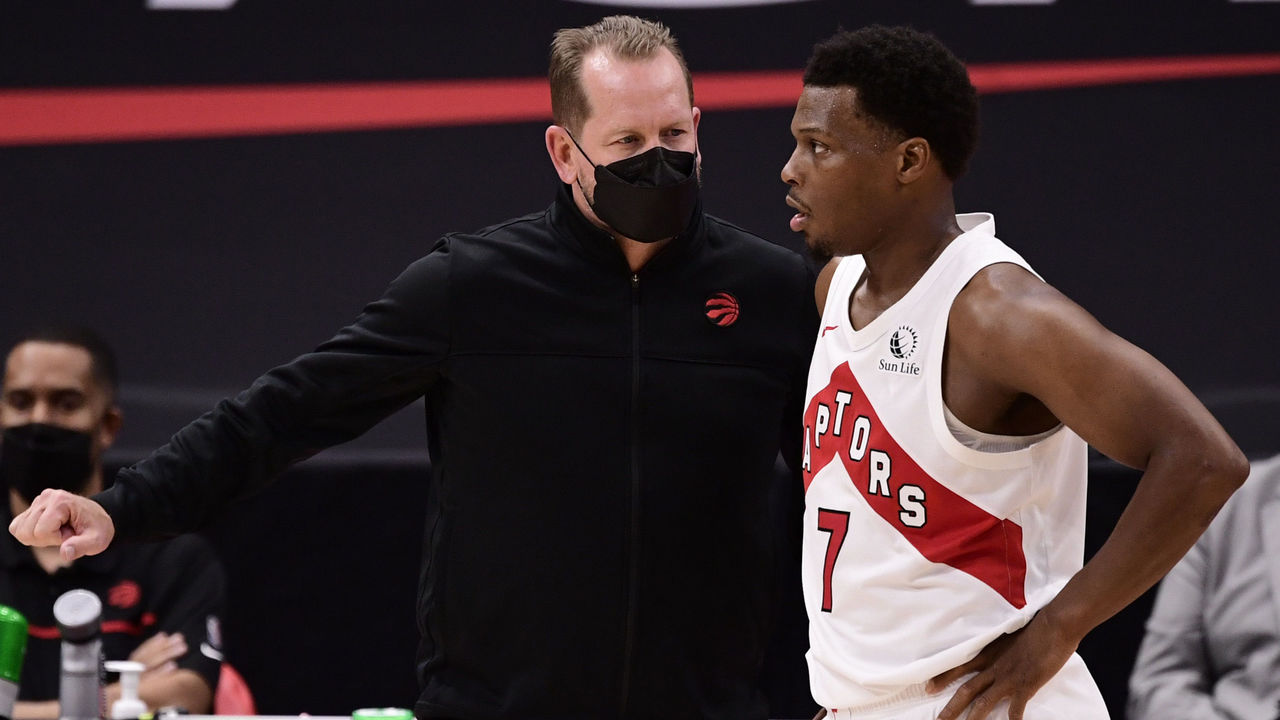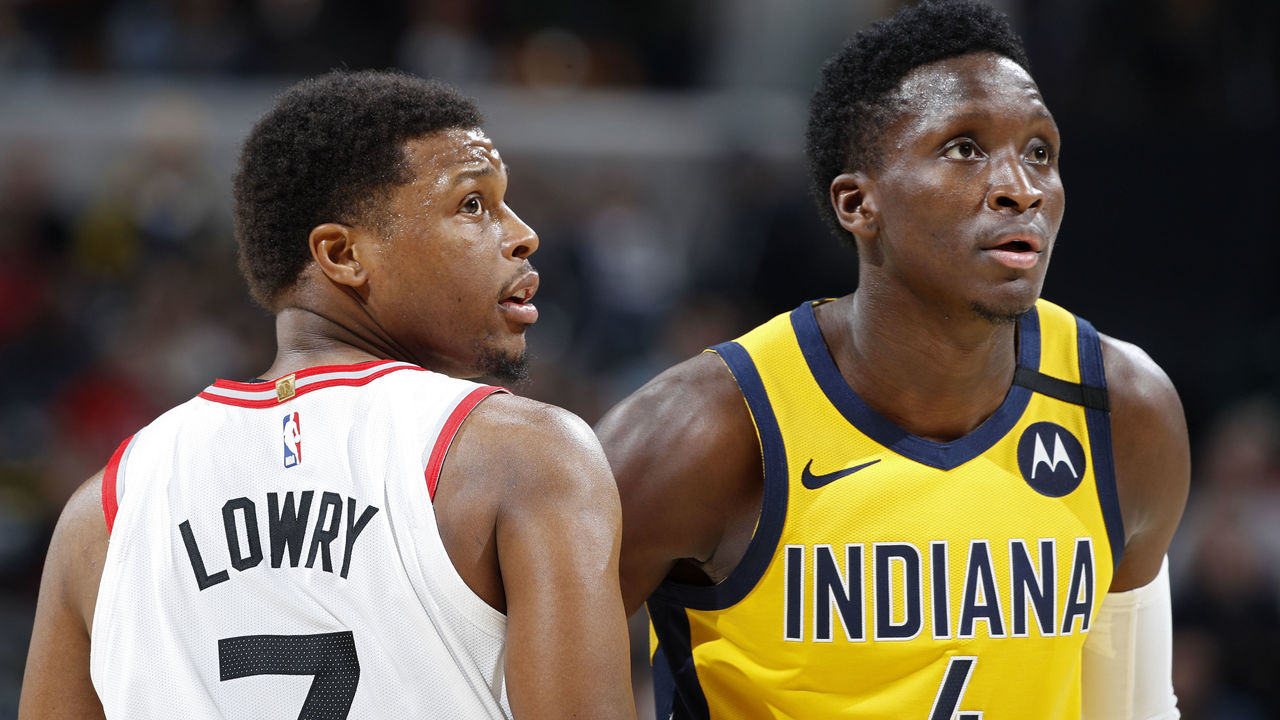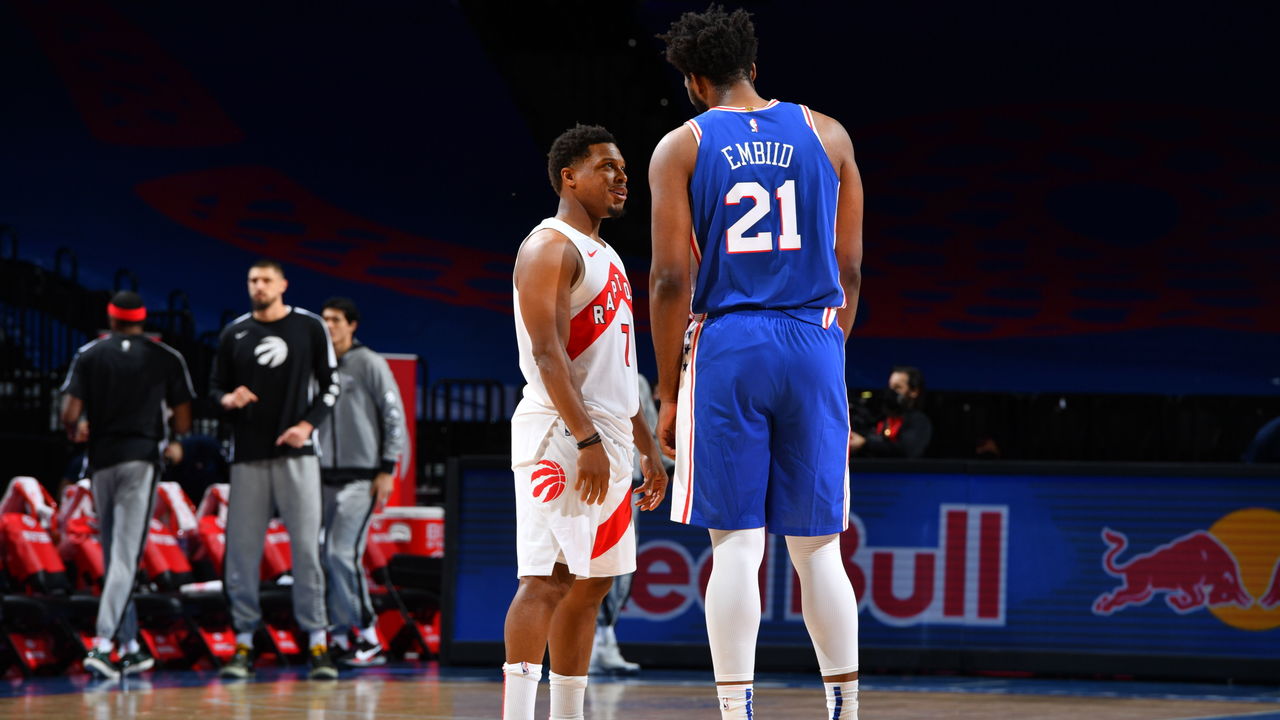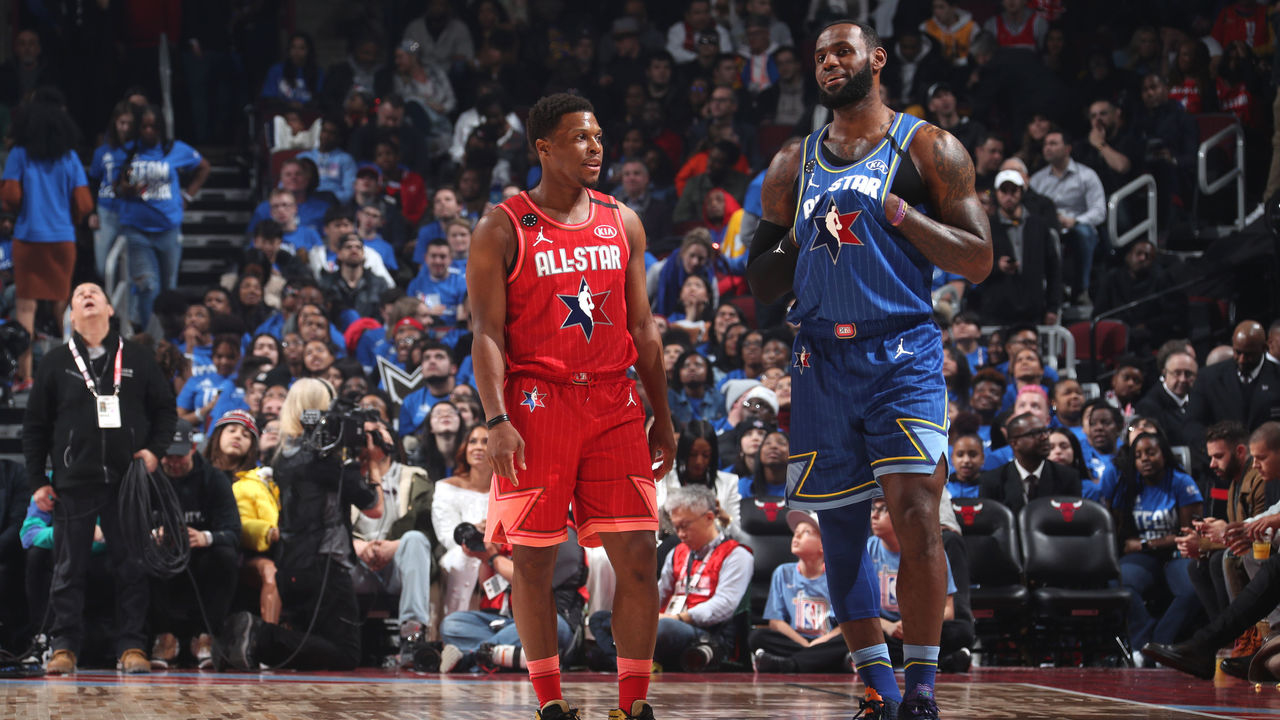The trade not made: Where Raptors, Sixers, Heat, Lakers go from here
The 2021 NBA trade deadline saw 16 deals made involving 48 players, 19 draft picks, and multiple stars. We already broke down what all those moving parts mean for the teams and players involved, but what about the trades that weren't made?
The prospect of Toronto trading Kyle Lowry loomed over this year's deadline, and the six-time All-Star staying put (for now) may actually be a bigger story than any of the moves made.
So, with analysis on the 16 completed trades already noted, here's how Lowry's extended stay with the Raptors affects not just Toronto, but the three teams that were reportedly Lowry's biggest deadline suitors.
Raptors

After all the rumors, negotiations, pre-emptive eulogies, and would-be swan songs, Lowry's still a Toronto Raptor. That might feel more surprising if it weren't so familiar.
Lowry nearly leaving the Raptors via trade or free agency is basically a biennial tradition at this point. As any Raptors fan can tell you, he never had any intention of sticking around in the first place. He's professed that when he was acquired in 2012 he considered Toronto a two-year stopover and nothing more. But try as they might, neither Lowry nor the organization could seem to find a way out of their increasingly entangled relationship.
He had his bags packed for New York in 2013, before James Dolan decided at the 11th hour that Iman Shumpert and a pick was too steep a price. Then the Raptors accidentally got really good, Lowry and DeMar DeRozan developed a deep bond, and next thing Lowry knew he was leading the team to its first playoff berth in six years and re-upping for three more years in the offseason.
He hit free agency again in 2017, after a second-round sweep at the hands of the Cavaliers seemed to reveal the Raptors' ceiling, and there were plenty of rumblings that he was looking for a change of scenery. But teams that might've pried him away (like the Spurs, 76ers, and Timberwolves) opted not to seriously pursue him, and so he re-signed again. Over the next three seasons, the Raptors won 72% of their games, and a Larry O'Brien Trophy.
Even during the 2018-19 championship season that cemented Lowry's legacy as the greatest player in franchise history, it seemed for a moment as if he might be on the move. The Raptors reportedly pondered trading him for Mike Conley in the lead-up to the deadline. They kept him, raised a banner a few months later, then tacked an extra year onto the end of his deal.
In other words, Thursday was well-trod ground for Lowry and the team that's employed him for the last nine years. The trade market was always going to be what determined whether or not the Raptors pulled the trigger on a deal. They weren't going to trade Lowry for the sake of it, at least not without him outright asking them to do so. And since he felt comfortable sticking it out until he hits free agency after the season, the team didn't feel any pressure to accept a deal it didn't like.
There were reportedly only three serious suitors to which Lowry was amenable to being traded, and with none of the 76ers, Heat, or Lakers willing to meet Toronto's asking price in terms of draft-pick or prospect capital (no Tyler Herro, no Talen Horton-Tucker, no Sixers multi-first-round-pick package), the front office decided it was better off retaining Lowry's Bird rights and either re-signing him or flipping him in a sign-and-trade this summer. In other words, we'll get to do the whole will they/won't they dance again in a few months. Fun!
In the meantime, the fan base will get to root for its most beloved player for at least another 28 games, and the Raptors will have a far better chance than they otherwise would've had to snag a play-in spot, reach the postseason proper, and give some team a headache in the first round. If that's all they get out of this, if Lowry ultimately decides to leave and sign with a cap-space team like Miami outright, and the Raptors' stubbornness turns out to have cost them Duncan Robinson and Precious Achiuwa, then so be it.
Lowry may have just turned 35, but he's still a fantastic player, and he means more to the Raptors - even if he only has two months left with them - than some middling prospects do. For now, the GROAT stays. - Joe Wolfond
Heat

Of the three potential Lowry suitors that failed to get their man, Miami's the team that should sleep most soundly.
Reports indicated that the Heat were willing to put rookie big man Achiuwa and sharpshooter Robinson (a pending free agent) on the table, but not Tyler Herro, who is six years younger than Robinson and comes with an extra two years of team control. Overvaluing homegrown talent like Herro can often undermine teams in their pursuit of game-changing stars like Lowry, but the decision was defensible from Miami's perspective.
The Heat were instead able to acquire Victor Oladipo for pennies on the dollar, surrendering Kelly Olynyk, Avery Bradley, and a 2022 first-rounder (Houston will get whichever of Miami's or Brooklyn's 2022 picks is better). Oladipo doesn't impact the game at the same level as Lowry, but a good argument can be made that the Heat will be better served by the roster left with Oladipo in the fold than they would've been by the more depleted team they'd be left with had they caved to Toronto's Lowry demands.
In other words, the drop-off from Lowry to Oladipo might not be as stark as the overall drop-off that comes from trading Herro, Achiuwa, one of Olynyk or Goran Dragic (for salary filler), and Bradley, as opposed to just Olynyk and Bradley.
Should the partnership with Oladipo not go as swimmingly as expected, there's no sunk cost in losing him to free agency, given that Olynyk and Bradley weren't going to be part of Miami's plans beyond this season. In that worst case scenario where Oladipo bails, the Heat could always make a run at Lowry this summer, when the future Hall of Famer tests free agency, himself.
The Heat's new-look rotation possesses more two-way upside than all but a few teams. If Oladipo proves a perfect match in Miami, where he's reportedly yearned to end up all along, and agrees to re-sign with the Heat this summer, the team's looking at a future core of Jimmy Butler, Bam Adebayo, Oladipo, Herro, and Achiuwa, with the latter two still holding plenty of trade value.
The Heat didn't come away from the deadline with Lowry, but Miami found a way to raise its short- and long-term ceiling while minimizing its risk. You can't ask for much more than that. - Joseph Casciaro
76ers

On its face, it was justifiable for the Sixers to decide that the asking price for Lowry was too rich for their blood. For as much as he could've helped them by addressing basically all of their most pressing needs, asking a team to fork over two prospects and two first-round picks (as the Raptors were reportedly doing) for a 35-year-old impending free agent is asking a lot.
There are a couple significant questions that the Sixers had to weigh in working out the risk/reward calculus here. The first is whether Lowry would've been enough to vault them above Milwaukee and Brooklyn in the Eastern Conference pecking order. The second is whether acquiring Lowry would've been the best use of their resources in the grand scheme. If their answer to either one of those questions had been yes, Lowry would almost certainly be a member of his hometown team right now. Instead, they decided to make a much safer, more affordable play for George Hill, who fills some but not all of their needs.
Were they right to hold the line and ultimately walk away?
In regards to the first question, we can only hypothesize about how they would've stacked up to the rest of the East with Lowry in the fray, but they certainly would've had no less than a puncher's chance. Joel Embiid is arguably the single biggest individual matchup advantage in the conference, but without high-level half-court creators around him, he simply has to do too much by himself to beat high-level defenses. Lowry would've lightened his load and amplified his advantages. Lowry's passing and pull-up shooting would've also allowed Ben Simmons to more naturally shift into his most effective half-court role - as a rim-runner, pick-and-roll screener, and secondary playmaker.
The Nets would still likely be favored in a series. As much as the Sixers would gain by adding Lowry, they'd also be losing a ton of wing defense between Matisse Thybulle and Danny Green. Lowry can guard up a position or two, but he's not the point-of-attack defender he once was. Even so, Philly would've closed the gap considerably, if not entirely. Hill is a capable ball-handler and a great shooter who can further space the floor for Embiid, but he's a middling playmaker who isn't going to be relied upon to initiate high-leverage postseason possessions. He doesn't move the needle to nearly the same extent.
The second question might be the more pertinent one: Was Lowry simply not the right guy to chase? It's possible Daryl Morey didn't pull the trigger because he thinks the Sixers are already good enough as constructed to win a title. Or maybe he thinks a better trade opportunity will eventually materialize. By retaining all their best trade assets, the Sixers kept their powder dry for a potential blockbuster down the road. Should Bradley Beal ever become available, for example, they'll likely be glad to still have the cupboard full. Odds are this won't be their only opportunity to add a major piece to the Simmons-Embiid core (or just the Embiid core, if the target is big enough to require Simmons be sent out).
Perhaps the signs of slippage Lowry has shown made the prospect of acquiring his Bird rights and re-signing him through his age-37 season less enticing. Morey's long been a win-now executive, but that doesn't mean he's incapable of taking the long view. He clearly thought this wasn't the moment to push his chips into the middle.
And yet, for all the reasons it made sense for Philly to pass, it's hard not to feel disappointed by the missed opportunity. Morey's the guy who famously said that if your team has even a 5% chance to win, "you've gotta be focused all on winning the title." The guy went all-in to try to take down the Warriors at the height of their dynasty. Obviously, there are limits to that ethos, and the fact Embiid and Simmons are still relatively young means Morey can afford to be more patient than he's been in the past.
But Embiid's playing the best basketball of his life, and some of the best basketball any modern center has played. Given his injury history, there's no telling how many more seasons like this the Sixers will get from him. When you have a superstar in his prime, there's never a wrong time to go all-in. - Wolfond
Lakers
The Lakers' dearth of young talent and draft capital made them a surprise entrant in the Lowry sweepstakes, but the simple mention of the defending champions likely sent shockwaves throughout the league.
If and when LeBron James and Anthony Davis return to full health, the Lakers will still be the team to beat. Had they found a way to acquire Lowry and complete a stunning new Big Three, the NBA would've been lunch meat. The combined basketball IQ of LeBron and Lowry (plus Marc Gasol) would've given the Lakers an unfathomable advantage.

There's a few ways to look at the Lakers' failed pursuit of Lowry.
On one hand, you can argue they never had enough to get a deal done given how hard a bargain Masai Ujiri was driving, as Talen Horton-Tucker is the team's lone true prospect, and the Lakers can't trade a first-round pick until 2027. But Horton-Tucker and a lightly protected 2027 first-rounder - a pick far enough into the future to imagine life without LeBron - actually isn't a terrible offer, and I'm not convinced the Raptors would've turned it down.
From that perspective, it seems ludicrous that the Lakers would've held this deal up because they were unwilling to include Horton-Tucker. Championship windows are never open as long as incumbent teams want to believe they are, there's a rising power in Brooklyn, and James will be 37 in December. If the Lakers fall short in the playoffs or another injury hobbles them along the way, it'll be fair to ask whether L.A. just passed on the chance to secure James another title because it overvalued Horton-Tucker, who's about to hit restricted free agency.
Things are rarely that black and white, though, and you can just as easily make the argument that if the Lakers are confident in the healthy returns of James and Davis, they view themselves as championship favorites anyway. Why decimate a team already on track for another championship to match salaries in a blockbuster trade for an aging star? Lowry makes more than $30 million this season, and in addition to Horton-Tucker, the Lakers would've had to move Dennis Schroder and one of Montrezl Harrell or Kentavious Caldwell-Pope to make the math work.
There's more: Given that Horton-Tucker and draft picks far into the future might be the franchise's best trade chips right now, it's understandable that the Lakers chose to hold on to those assets. Assuming Horton-Tucker is re-signed to a reasonable deal, what might a package built around THT and a future pick be able to fetch the Lakers next year, when Harrell will be on an expiring contract and Kyle Kuzma's extension kicks in, thereby increasing his cap hit?
If Horton-Tucker, one of Harrell or Kuzma, and a pick are turned into a bigger piece in pursuit of a 2022 championship and beyond, Rob Pelinka's patience and decision to pass on Lowry at the 2021 deadline will appear clairvoyant.
In any event, while plenty of teams' futures will be shaped by the moves they made on Thursday, the future of at least one of the teams above may now hinge on the biggest trade it didn't make. - Casciaro